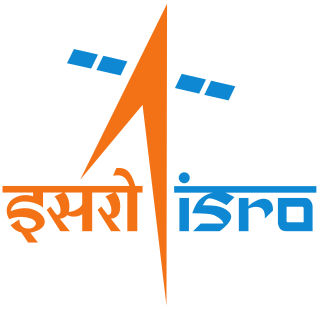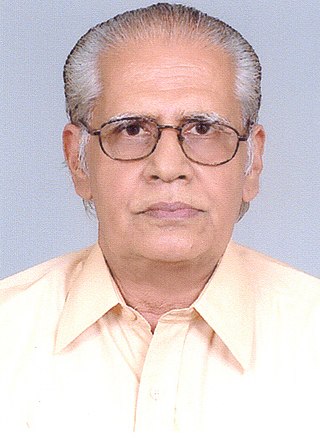
Vikram Ambalal Sarabhai was an Indian physicist and astronomer who initiated space research and helped to develop nuclear power in India. Often regarded as the "Father of Indian space program", Sarabhai was honored with Padma Bhushan in 1966 and the Padma Vibhushan (posthumously) in 1972.
Ramanujam Varatharaja Perumal is an aeronautical scientist and an aerospace engineer of India. He was a director at LPSC, a unit of Indian Space Research Organisation(ISRO).

Indian Institute of Space Science and Technology (IIST) is a government-aided institute and deemed university for the study and research of space science, located in Near Vithura, Thiruvananthapuram, India. IIST was set up in 2007 by the Indian Space Research Organisation (ISRO) under the Department of Space, Government of India.

Indian Deep Space Network (IDSN) is a network of large antennas and communication facilities operated by the Indian Space Research Organisation to support the interplanetary spacecraft missions of India. Its hub is located at Byalalu, Ramanagara in the state of Karnataka in India. It was built under the leadership of S K Shivakumar, the then ISTRAC Director and inaugurated on 17 October 2008 by the former ISRO chairman G. Madhavan Nair.

The chairman of the Indian Space Research Organisation is the statutory head of the Indian Space Research Organisation (ISRO). The officeholder is a secretary to the Government of India and an executive of the Department of Space (DOS) which directly reports to the prime minister of India.
Parivakkam Subramaniam Veeraraghavan is a well known space scientist and rocket technologist of India. He has served as the Director of Vikram Sarabhai Space Centre (VSSC), Thiruvananthapuram, Kerala and as the Director of ISRO Inertial Systems Unit (IISU), Thiruvananthapuram. One of the most senior scientists at Indian Space Research Organization (ISRO), Veeraraghavan is known for his contributions to launch vehicle technology, especially in the areas of integration & checkout and Inertial Systems of ISROs launch vehicles. Presently, he is holding the honorary position of Prof. Vikram Sarabhai Distinguished Professor in VSSC, ISRO since January 2013.
Vipparthi Adimurthy is the ISRO Honorary Distinguished Professor, VSSC. He was the former Satish Dhawan Professor and Dean of Research at the Indian Institute of Space Science and Technology (IIST). Prior to joining IIST, Adimurthy held the post of associate director at the Vikram Sarabhai Space Centre, a major facility center of Indian Space Research Organisation (ISRO). He is known for his contributions to the rocket technology and space dynamics. He is a recipient of Padma Shri from the Government of India. Murthy is the Mission Concept Designer, for India's Mars Orbiter Mission.

M. C. Dathan is an Indian space scientist and former director of the Vikram Sarabhai Space Centre (VSSC). The Government of India honoured him, in 2014, by awarding him the Padma Shri, the fourth highest civilian award, for his contributions to the fields of science and technology. In May 2016, the Government of Kerala appointed MC Dathan as the scientific advisor to chief minister.

The SCE-200 is a 2 MN thrust class liquid rocket engine, being developed to power Indian Space Research Organisation's (ISRO) existing LVM3 and upcoming heavy and super heavy-lift launch vehicles. It is being developed by the Liquid Propulsion Systems Centre (LPSC) of ISRO, and is expected to have first flight in 2020s.
Mars Lander Mission (MLM) or Mangalyaan-2, is a proposed second mission to Mars by the Indian Space Research Organisation (ISRO).

Sivan Kailasavadivu is an Indian aerospace engineer who served as the Secretary of the Department of Space and Chairman of the Indian Space Research Organisation(ISRO) and Space Commission. He has previously served as the Director of the Vikram Sarabhai Space Center and the Liquid Propulsion Systems Centre.
Madhavan Pillai Ramakrishna Kurup was an Indian rocket scientist and the founder of the first solid rocket propellant plant in India at the Vikram Sarabhai Space Centre. He is known to have contributed to the successful launching of the Augmented Satellite Launch Vehicle (ASLV) as the director of the VSSC centre in Thiruvananthapuram. The Government of India awarded him the fourth highest civilian award of Padma Shri in 1990.
Tumkur Seetharamaiah Prahlad is an Indian aerospace scientist and the former director of the National Aerospace Laboratories (NAL), Bengaluru, known as a specialist in Aerodynamics and Aerospace Design. His contributions are reported in Indian civil aircraft development programmes of Hansa and NAL Saras and light combat aircraft development programme. The Government of India awarded him the civilian honour of the Padma Shri in 2004, The same year, he received the H. K. Firodia Award from H. K. Firodia Memorial Foundation.
Suryanarayanan Srinivasan (1941–1999) was an Indian aeronautical engineer and the Director of the Vikram Sarabhai Space Centre (VSSC), known for his pioneering work in rocket science. He also served as the director of Satish Dhawan Space Centre and assisted A. P. J. Abdul Kalam in the SLV3 Mission as its deputy director. He was an elected Fellow of the Aeronautical Society of India and the Indian National Academy of Engineering. The Government of India awarded him the third highest civilian honour of the Padma Bhushan, in 2000, for his contributions to Indian space program.

P. V. Manoranjan Rao is a veteran space scientist and author from India. In his career spanning over three decades — including over two decades at the Indian Space Research Organisation's Vikram Sarabhai Space Centre — he has done extensive research in areas including the physics of lightning discharge, ionospheric physics, magnetospheric physics, VLF and ELF wave propagation, electrostatics of launch vehicles, electrostatic charging of communications satellites, EMI/EMC and lightning protection for launch vehicles. He has edited and authored three books on India's space history.

Dr. Sreedhara Panicker Somanath is an Indian aerospace engineer serving as the chairman of the Indian Space Research Organisation (ISRO). Under his chairmanship, ISRO carried out the third Indian lunar exploration mission named Chandrayaan-3. The lander named Vikram and the rover named Pragyan landed near the lunar south pole region on 23 August 2023 at 18:04 IST, making India the first country to successfully land a spacecraft near the lunar south pole and the fourth country to demonstrate soft landing on the Moon. This landing gained India a proud history.
P. Kunhikrishnan is a Space Scientist from India. Currently, he is a Distinguished Scientist & Former Director of U.R.Rao Satellite Centre (URSC), in Bengaluru, India. He was a member of Space Commission, Government of India

Subha Varier is an Indian space engineer. She has specialised in the video systems used on Indian satellite launches. In 2017 she received the Nari Shakti Puraskar, India's highest award for women after the record release of 104 satellites in one launch.

S. Unnikrishnan Nair is an Indian aerospace engineer presently serving as the director of Vikram Sarabhai Space Centre (VSSC). He is known for his works in the field of launch vehicle design, Space Capsule Recovery Experiment (SRE), and Human Spaceflight Programme. Prior to his directorship of VSSC, he was Director of Human Space Flight Centre, Bengaluru. He is also currently holding the additional charge of the Director, Indian Institute of Space Science and Technology.
Kovoor Ninan Ninan is a space scientist from India, known for his contributions to the development of rocket propellants, polymers and chemical systems for India's space program. Among other roles, during his career spanning over four decades in the Indian Space Research Organisation (ISRO), he served as the Deputy Director of Vikram Sarabhai Space Centre (VSSC) at ISRO. He later served as an emeritus professor at the Indian Institute of Space Science and Technology (IIST).










